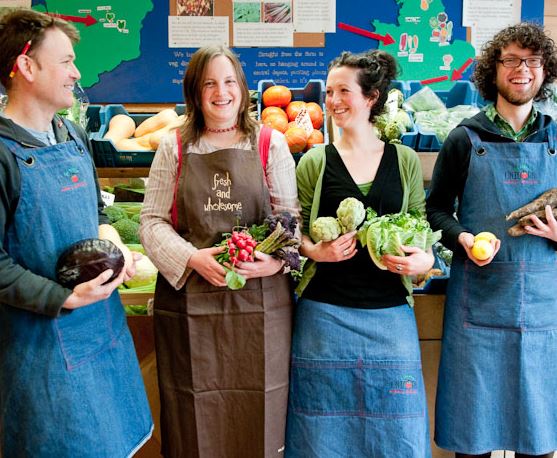In 2019, the gap between a community and the food it consumes can feel wider than ever.
That’s because in the UK most of the £179.1 billion spent on groceries goes through supermarkets, with their convoluted and often non-transparent supply chains. Then there’s the fact that what they sell makes profits for distant shareholders, not the workers who grow or sell it.
But there is another way. The UK’s independent food co-operatives are demonstrating a worker-owned approach that brings food and people together.
Debbie Clarke is one of the owner-workers at Unicorn Grocery, an award-winning Manchester food retailer that’s supplied fresh, fairly-traded and organic produce to local people since 1996.
“We care about how the food we sell is produced and where it comes from – plus we want to make it affordable for local people,” she says. “Alongside that we have a vision for a business that’s democratically owned by its workforce.”
At a workers’ co-op like Unicorn Grocery everyone has a say in where the business is headed, from the opening hours to the products sold, because they collectively own it.

Clarke was first attracted to Unicorn Grocery because of its commitment to organic food and responsible trading. She says it took “months, if not years” to fully appreciate what being an owner really meant on a personal level.
“You eventually realise that it’s your business,” she explains. “So you reap the benefits but you also have a responsibility to nourish it and make sure it thrives. It’s a unique experience to feel like you can shape it and collectively steer its direction.”
Co-ops essentially come in two varieties. There’s those owned and run by their customers (like the Co-op supermarket), and those owned and controlled by their workers (like Unicorn). Worker, or employee, owned companies don’t have to be co-operatives, that’s just one model they can choose. Community-owned businesses offer an other form of ethical business with a similar ethos.
For those used to traditional food retail, the workers’ co-op model might feel alien. Yet it’s always been part of our home-grown food culture.
People have been working democratically to meet their needs since time began. Then in 1844, a group of activists in Rochdale– known as the Rochdale Pioneers – wrote down the principles of democratic ownership, launching the official co-op movement. The model thrived, until free-market capitalism kicked off in earnest and private ownership took over.
Today there are 7,215 independent workers’ co-ops in the UK with a turnover of £37.7bn, just over 50 fewer than in 2018. Trade association Co-operatives UK say this is down to fewer new co-ops, as awareness of the model remain relatively low.

John Lewis (owner of Waitrose) is by far the biggest. But the landscape’s large enough to include stalwarts like Infinity Foods in Brighton (40 years old this year) and newcomers like Black Cat vegan café in London.
“I think that in particular, small, organic and vegan co-ops are really having a moment right now,” says John Atherton, head of membership at Co-operatives UK.
“People are just bored of shopping at Tesco or Starbucks. Increasingly, they want to support operations that are more moral and ethical.”
In principle, workers’ co-ops don’t have to act ethically. As Atherton points out, their purpose is to maximise benefits for their members, rather than making money for shareholders. In theory, the driving force could be: “Let’s all make loads of money at all costs. But because co-ops are driven by people that doesn’t happen,” he says.
“When you give people ownership and control of a business, they tend to start to think beyond their own salary to the wider community.”
“Working at a co-op can feel more like stewardship than ownership,” says Clarke, at Unicorn Grocery. “In effect, you’re caretaking it for the next generation of owners.”
Tilly Jarvis, food co-op project coordinator at Sustain, supports a range of small-scale UK food co-ops, including groups of students getting together on campus to sell nourishing produce.
“We’re not talking about co-ops as a legal structure,” she says. “It’s about small-scale co-operation. People getting together to do something they can’t do alone. It’s often volunteers shortening the food chain and offering good food that’s both sustainable and affordable.”
The Dyserth Community Fruit and Veg Co-op is a volunteer-run co-operative in Wales that’s been running for 12 years. Every week it supplies locally grown fruit and veg to residents at £4 for a mixed bag.
“Our users are mainly families with young children, and older people,” says Reverend Colin Richards, who helps organise each session.
“We were looking for good things we could do in the community and a food co-op seemed the right way to go.” At 90, Richards isn’t necessarily looking too far into the future. Yet he believes the volunteer-run approach will see the project continue to benefit local people.
“We have volunteers join all the time,” he says. “People feel a lot of uncertainty at the moment with Brexit. But whether prices go up or down, people will be able to get affordable fruit and veg from us.”












Since Riverford has become a cooperative that was one more reason why I Choose to shop with them. I also like that they in turn supply many goods from other cooperatives. We need to spend our money in the most effective way, including Fair trade.